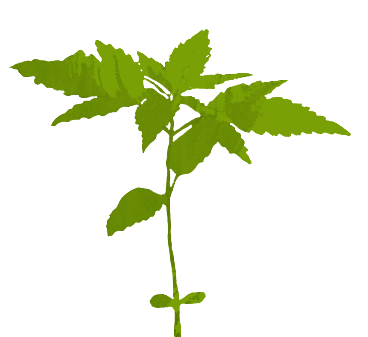Rediscovering the Microbial Legacy of Seeds
Research ·Seeds carry more than just genetic material; they are living reservoirs of microbial communities passed from one plant generation to the next. This process, known as microbial inheritance, plays a fundamental role in plant health and adaptation. However, modern breeding practices have largely overlooked this hidden legacy, often disrupting long-standing plant-microbe relationships in pursuit of specific agronomic traits.
In our research, we investigated how domestication has shaped the seed microbiome of Cannabis. By analyzing 46 Cannabis genotypes, ranging from traditional landraces to intensively bred varieties, we found that breeding has led to a significant reduction in microbial diversity. As selection pressures focused on plant traits such as cannabinoid content and fiber quality, the complexity of the seed microbiome diminished, potentially stripping plants of beneficial microbial partners accumulated over thousands of years.
When seeds germinate, their microbes establish a foundation for the plant’s microbiome, influencing root development, disease resistance, and nutrient uptake. In highly domesticated Cannabis varieties, this process appears to be increasingly dominated by a narrower set of microbial species, potentially limiting the plant’s ability to respond to environmental challenges.
The loss of these microbial allies raises important questions about how breeding decisions have influenced plant resilience. Among the missing microbes, We identified Bacillus frigoritolerans C1141, a bacterium highly associated to low-domesticated Cannabis genotypes and nearly absent in modern cultivated varieties. This bacterium possesses a suite of plant-beneficial traits, including the ability to solubilize nutrients, enhance stress tolerance, and promote growth through phytohormone production.
To test whether lost microbial diversity could be restored, we reintroduced B. frigoritolerans C1141 to Cannabis plants under both controlled and field conditions. The results were striking: treated plants grew 43% taller, developed nearly double the stalk diameter, and produced three times the biomass compared to untreated controls. These findings suggest that reintroducing beneficial microbes lost during domestication could serve as a powerful tool for improving crop performance without relying on synthetic inputs.
Rather than viewing plants as standalone organisms, we must recognize them as holobionts—intimately connected with their microbial symbionts. This study highlights the need for a microbiome-aware approach to plant breeding. By integrating microbial conservation into agricultural strategies, we could develop crops that naturally resist pathogens, adapt to stress, and optimize nutrient uptake.
As we refine our understanding of microbial inheritance, we open new possibilities for transforming agriculture. Moving beyond a reliance on chemical interventions, we can leverage the power of plant-associated microbes to create more resilient and sustainable cropping systems. In the case of Cannabis (and potentially many other crops) the key to future agricultural success may lie not just in the genes of the plant, but in the invisible microbial partners it carries within its seeds.
Keywords: Cannabis • Domestication • Endophytes • Seed microbiome • Sustainable plant cultivation
Read the research here

